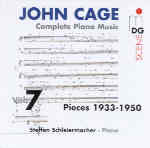Volume 7 of Steffen Schleiermacher’s complete John Cage piano music survey encompasses a nice cross-section of the composer’s earlier through-composed, “non-prepared” works for the instrument. As with previous volumes in this series, Schleiermacher’s technical finesse and keen ear for nuance and color help him to reveal numerous pianistic beauties in these scores that often are glossed over by self-described Cage specialists. For example, The Seasons’ rainbow-like arpeggios, prismatic tone clusters in different registers, and split-second changes of mood and texture are ravishingly shaped and proportioned in a manner akin to Walter Gieseking’s Debussy. Even the spindly lines and percussive repeated notes in Metamorphosis move in long arcs that are rhythmically centered without sounding notey. Ophelia gets a fierce, grantic performance that pounces on Cage’s volatile dynamic contrasts in a manner quite different from Margaret Leng Tan’s more lyrically conversational reading (New Albion), or Anthony de Mare’s altogether quicker, more compact version (Koch).
If Schleiermacher doesn’t convey the Jazz Study’s relaxed syncopation with total idiomatic assurance, he brings a lovely, undulating continuity to the darting linear displacements characterizing the second of the 1935 Two Pieces. It’s quite different from Anthony De Mare’s driving, Prokofiev-like conception. Listeners familiar with the prepared piano piece A Room (1943) included on Volume 1 in this series will be fascinated to compare it to the work’s “unprepared” counterpart presented here. The former is mysterious and hypnotic, the latter sounds simple, aphoristic, and disarming. In sum, a delightfully varied program, exceedingly well played, superbly engineered, and graced with excellent booklet notes.
































